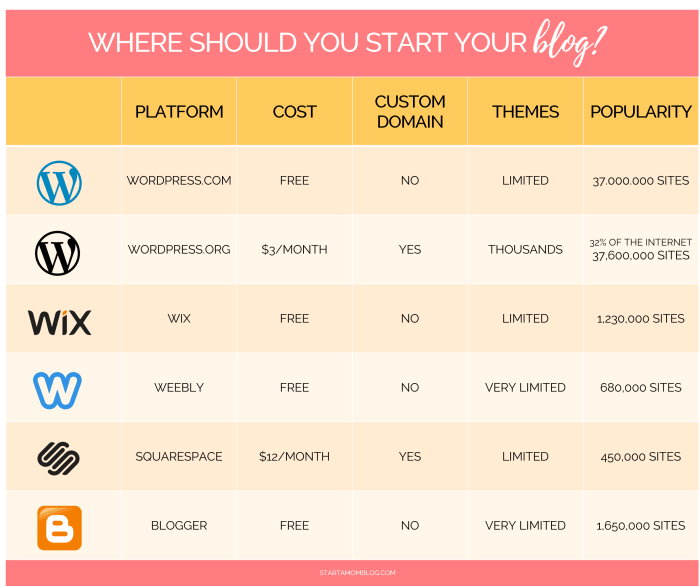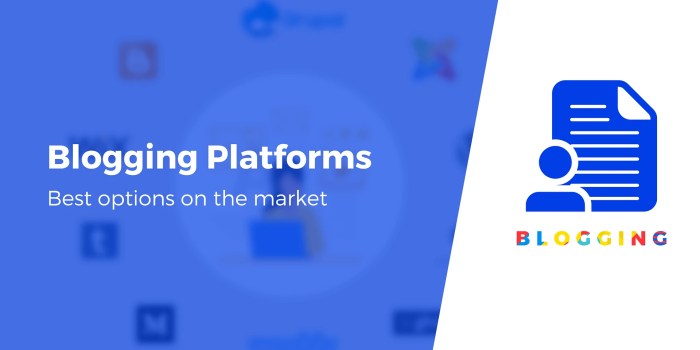Best Blogging Platforms sets the stage for this enthralling narrative, offering readers a glimpse into a story that is rich in detail with a hip American high school vibe and brimming with originality from the outset. From defining blogging platforms to exploring customization options and monetization opportunities, this guide has got you covered.
Introduction to Blogging Platforms

When it comes to sharing your thoughts, ideas, and expertise online, a blogging platform is the place to be. A blogging platform is a software service or application that allows you to create and publish content on the internet. It provides you with the tools and templates needed to design and customize your blog according to your preferences.
Choosing the best platform for your needs is crucial as it can greatly impact your blogging experience. The right platform can make it easier for you to create and manage your content, attract readers, and grow your online presence. It can also offer various features like search engine optimization () tools, social media integration, and analytics to help you track the performance of your blog.
Using a dedicated platform for blogging has many benefits. It provides you with a professional-looking website that reflects your brand or personality. It also ensures that your content is hosted securely and backed up regularly, protecting it from potential loss. Additionally, blogging platforms often have a community of users and support resources that can help you troubleshoot issues and improve your blog over time.
Popular Blogging Platforms

When it comes to choosing a blogging platform, there are several popular options to consider. Each platform offers unique features, ease of use, and customization options, catering to different blogging needs.
1. WordPress
WordPress is one of the most widely used blogging platforms, known for its flexibility and customization options. It offers a wide range of themes and plugins to enhance the functionality of your blog. Popular blogs using WordPress include TechCrunch and The New Yorker.
2. Blogger, Best Blogging Platforms
Blogger, owned by Google, is a simple and user-friendly platform perfect for beginners. It offers basic customization options and is integrated with Google services. Well-known blogs on Blogger include The Pioneer Woman and Cupcakes and Cashmere.
3. Medium
Medium is a platform that focuses on writing and reading quality content. It offers a clean and minimalist design, making it easy for writers to focus on their words. Some notable blogs on Medium include The Startup and Better Humans.
4. Wix
Wix is a website builder that also offers blogging capabilities. It comes with drag-and-drop features, making it easy to create a visually appealing blog. Blogs like Eat Sleep Wear and The Blonde Salad are hosted on Wix.
5. Squarespace
Squarespace is known for its stunning templates and built-in design tools. It is a popular choice for bloggers looking to showcase visual content. Notable blogs using Squarespace include Design*Sponge and Oh Joy.
Customization Options
When it comes to customizing your blog, different platforms offer various features to help you create a unique and visually appealing website that reflects your personal style. Let’s explore some of the customization options available on popular blogging platforms:
Themes and Templates
- Most blogging platforms provide a selection of pre-designed themes and templates for you to choose from. These themes can be easily customized with your own colors, fonts, and images to match your brand or personal aesthetic.
- Some platforms also allow you to upload custom themes or create your own from scratch using HTML and CSS, giving you complete control over the look and feel of your blog.
Layouts and Widgets
- You can typically rearrange the layout of your blog by dragging and dropping different elements such as headers, sidebars, and footers. This flexibility allows you to create a unique and user-friendly design that suits your content.
- Widgets are also commonly available on blogging platforms, allowing you to add functionality to your blog such as social media feeds, search bars, and subscription forms.
Custom CSS and HTML
- If you have coding knowledge, many platforms offer the option to add custom CSS or HTML code to further personalize your blog. This can be useful for fine-tuning the design or adding advanced features that are not available through the platform’s built-in customization tools.
- By editing the CSS and HTML of your blog, you can truly make it stand out from the crowd and create a completely unique online presence.
Monetization Opportunities
In the world of blogging, there are various ways to monetize your platform and turn your passion into a source of income. From affiliate marketing to sponsored content and ads, there are plenty of revenue streams available to bloggers. Here are some insights on maximizing your earnings through different blogging platforms.
Affiliate Marketing
Affiliate marketing is a popular way for bloggers to earn money by promoting products or services of other companies. By including affiliate links in your content, you can earn a commission for every sale or lead generated through your referral. It’s essential to choose products or services that align with your blog’s niche to increase the chances of conversions.
Sponsored Content
Sponsored content involves collaborating with brands to create posts that promote their products or services. Bloggers can earn money by writing sponsored posts, creating product reviews, or sharing sponsored social media updates. It’s important to disclose sponsored content transparently to maintain trust with your audience.
Ads
Displaying ads on your blog is another common way to monetize your platform. You can join ad networks like Google AdSense or work directly with brands for sponsored ad placements. It’s crucial to balance the number of ads on your site to ensure a positive user experience while still generating revenue.
Other Revenue Streams
In addition to affiliate marketing, sponsored content, and ads, there are other ways to monetize your blog. This includes selling digital products like ebooks or online courses, offering consulting services, or hosting webinars and events. Diversifying your income streams can help you maximize your earnings and create a sustainable revenue model for your blog.
Community and Support: Best Blogging Platforms
Building a strong community and providing support are essential aspects of successful blogging platforms. Engaging with your audience and providing assistance can help foster loyalty and increase reader interaction.
Building a Loyal Audience
- Regularly interact with your readers through comments, social media, and email newsletters to build relationships.
- Create engaging content that resonates with your audience to keep them coming back for more.
- Encourage user-generated content and discussions to make readers feel involved in your blog community.
Customer Support and Help Resources
- Check if the platform offers customer support through email, chat, or forums for technical issues or inquiries.
- Explore help resources such as knowledge bases, tutorials, and FAQs to troubleshoot common problems.
- Join online communities or forums related to the platform to connect with other users and share experiences.